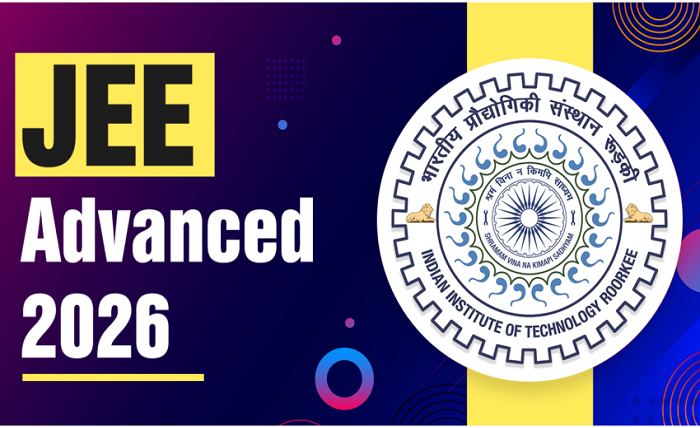Preparing for JEE 2026 is one of the crucial journeys you will take as an engineering aspirant in India now. The JEE exam is not just an academic knowledge test. It is also a test of consistency, discipline, time management and smart strategies. These innovative strategies may include specific approaches that have been proven effective in enhancing learning and performance. Every year, lakhs of students will be motivated and willing to work hard to take admission to prestigious institutions like IITs, NITs and IIITs, making the JEE highly competitive. To succeed in this competitive landscape, students need to set an effective preparation plan, thoroughly understand the JEE syllabus, and reflect on effective strategies.
This article presents a step-by-step guide with expert tips to prepare for JEE 2026, whether you are just beginning to prepare or are already halfway through.
Understand the JEE Syllabus Thoroughly
The first stage of successful planning is to understand the JEE Adv syllabus and JEE Main syllabus fully. This is not just a list of topics, but a roadmap to your success. The exam covers the concepts from Physics, Chemistry, and Mathematics of Classes 11 and 12. Many students immediately start using random study materials based on what is available, rather than analyzing what is actually required. Understanding the syllabus will give you a clear direction and help you avoid wasting time on unnecessary topics.
Experts recommend considering the NCERT syllabus and the JEE Adv and JEE Main syllabus to help identify overlapping topics and other areas that may require additional attention. JEE emphasizes concepts and application-based questions; therefore, students should avoid focusing only on rote learning, instead ensuring they understand each concept, its derivations, and applications.
Create a Realistic Study Plan
An organized study timetable is the foundation of your JEE preparation. Studying randomly or irregularly creates gaps in your knowledge and understanding. A reasonable study timetable should:
- Give equal time to all three subjects.
- Break the JEE syllabus into manageable chunks.
- Have time for revision, practice tests and working on your doubts.
- Schedule regular breaks to stay focused and avoid burnout.
Be sure to remember that having a consistent timetable is more effective than studying too much for a few days or weeks and then losing focus.
Practice Topic-Wise and Chapter-Wise Questions
Simply reading theory does not equate to practice. You’ll need to practice various questions from each chapter to become adept at problem-solving. Begin with simpler problems and then progress to more advanced ones. This will allow you to:
- Learn how to use your formulas.
- Understand the concepts that are repeatedly examined.
- Increase speed and accuracy.
By creating a question bank based on the JEE Main and Advanced syllabi, you will ensure that you are not wasting time on any unnecessary topics.
Master Time Management with Mock Tests
The biggest challenge in the JEE is managing time during the exam. You may understand concepts, but if you can’t answer questions in the time allotted, then you wasted your time studying. This is where mock tests and previous years’ question papers are essential.
By practising in exam-style conditions, you:
- Learn to manage your time across the three subjects, Physics, Chemistry, and Mathematics.
- Limit silly mistakes due to pressure or overthinking.
- Pinpoint your strong and weak areas that you can improve in.
Students are advised to focus more on high weightage topics like Modern Physics, Coordinate Geometry, Integral Calculus, Heat And Thermodynamics, Gravitation etc.
Experts recommend taking at least one full mock test per week in the early stages and then two or three as the exam approaches.
Analyse Mistakes and Work on Weak Areas
Mock tests and practice papers are only helpful if you take the time to analyze how you did on them. Students often take a mock test, not analyze it, and then repeat mistakes during the actual exam. After every test:
- Review your incorrect answers and evaluate the errors you made.
- Determine if it was a lack of knowledge, a calculation error, or real-time pressure.
- Review the subject matter of any weak concepts in the NCERT or reference books.
- Lastly, create a mistake notebook to record every error you make so that you can avoid them.
This feedback loop is the secret to turning standard preparation into strategic preparation.
Expert Tips from Toppers
- Be consistent rather than intense – Study every day (even for shorter hours) rather than irregular (but intense) rounds of studying at times.
- Be mindful of quality, rather than quantity. Study some crucial topics in great detail, rather than many topics at a surface level. If you’re unsure what is essential in the JEE syllabus, speak to your teacher or mentor.
- Be regimented – Make sure to avoid distractions while you’re in study mode.
- Don’t be afraid to ask for help when you need it. Don’t spend a day or two studying a concept if you can’t figure it out; reach out to a teacher, mentor or any verified resource for clarification.
- Be adaptable – It is okay if a study method doesn’t work out; an ability to adapt and be willing to try something new is essential.
Conclusion
Cracking the JEE Mains and JEE Advanced 2026 requires more than just hard work. It requires thoughtful planning, practice, and a thorough understanding of the JEE syllabus. Suppose you have a plan to study, focus on NCERT, practice mock tests, and consistently prioritize your health and well-being. In that case, you will gradually get closer to the perfect engineering institute.
Whatever you do, try to create positive habits and remember that even if one effort seems small, in the context of JEE and your study approach, it is incredibly huge. With dedication and discipline, it is very achievable.

